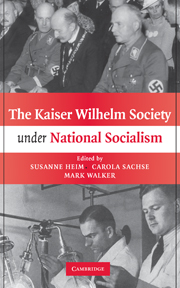Book contents
- Frontmatter
- Contents
- Tables
- Illustrations
- Editors
- Contributors
- Abbreviations
- Archives
- 1 The Kaiser Wilhelm Society under National Socialism
- SECTION I RESEARCH AND PERSONNEL POLICIES
- 2 A Success Story? Highlighting the History of the Kaiser Wilhelm Society's General Administration in the Third Reich
- 3 “No Time to Debate and Ask Questions” – Forced Labor for Science in the Kaiser Wilhelm Society, 1939–1945
- 4 Adolf Butenanbt between Science and Politics: From the Weimer Republic to the Federal Republic of Germany
- SECTION II RACIAL RESEARCH
- SECTION III EASTERN RESEARCH, LIVING SPACE, BREEDING RESEARCH
- SECTION IV MILITARY RESEARCH
- SECTION V THE POSTWAR “POLITICS OF THE PAST”
- Bibliography
- Index
4 - Adolf Butenanbt between Science and Politics: From the Weimer Republic to the Federal Republic of Germany
Published online by Cambridge University Press: 29 July 2009
- Frontmatter
- Contents
- Tables
- Illustrations
- Editors
- Contributors
- Abbreviations
- Archives
- 1 The Kaiser Wilhelm Society under National Socialism
- SECTION I RESEARCH AND PERSONNEL POLICIES
- 2 A Success Story? Highlighting the History of the Kaiser Wilhelm Society's General Administration in the Third Reich
- 3 “No Time to Debate and Ask Questions” – Forced Labor for Science in the Kaiser Wilhelm Society, 1939–1945
- 4 Adolf Butenanbt between Science and Politics: From the Weimer Republic to the Federal Republic of Germany
- SECTION II RACIAL RESEARCH
- SECTION III EASTERN RESEARCH, LIVING SPACE, BREEDING RESEARCH
- SECTION IV MILITARY RESEARCH
- SECTION V THE POSTWAR “POLITICS OF THE PAST”
- Bibliography
- Index
Summary
Whether it makes sense to investigate the political views and behaviors of a natural scientist is a valid question. Certainly it does not do justice to the lifetime achievement of a natural scientist to look at him first and foremost as a homo politicus. However, the opposite is also true: scientific research is located in a social and political context, which conditions this research in any number of different ways. Without any reference to the political situation in which scientists work, the historical dimension of their scientific activity cannot be sufficiently understood.
In the history of German science, this is especially true for the period of the fascist-totalitarian dictatorship of National Socialism. There is a common misconception that National Socialism was hostile to science. In fact, this regime offered previously inconceivable opportunities for professional development to scientists, or at least to those who were not ostracized or driven out of the country. Of course, the Nazi dictatorship also tempted scientists to disregard ethical principles and even to participate in research directly connected to the regime's crimes against humanity.
Therefore, it is legitimate to conduct a biographical investigation of Adolf Butenandt's political posture during the National Socialist period. Between 1933 and 1945, Butenandt experienced a spectacular scientific ascent. As a biochemist and director of one of the most important institutes of the Kaiser Wilhelm Society (Kaiser-Wilhelm-Gesellschaft, KWS), he was one of the leading natural scientists of the Third Reich.
- Type
- Chapter
- Information
- The Kaiser Wilhelm Society under National Socialism , pp. 74 - 96Publisher: Cambridge University PressPrint publication year: 2009
- 1
- Cited by

